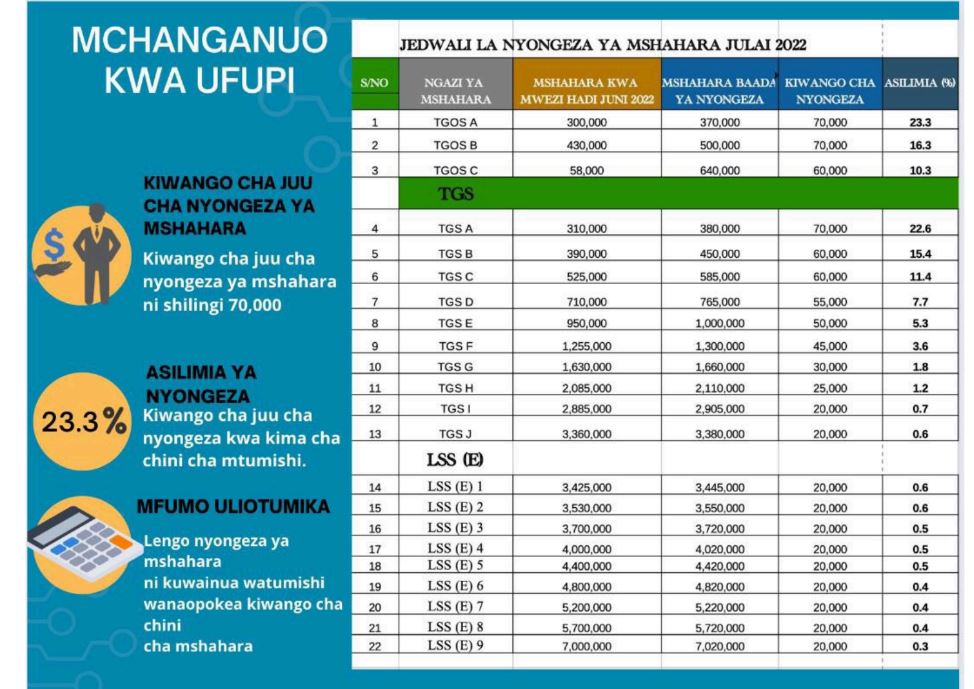We have you here The Government Salary Scale In Tanzania Explained, because many people have been coming across the briefly abbreviated terms representing The Government Salary Scale In Tanzania but they do not yet understand what these terms represent in terms of the actual salaries or Viwango Vya Mishahara Serikalini.
We have for you here the Government Salary Scale In Tanzania Explained because Understanding the Government Salary Scale in Tanzania is important for several reasons:
- Transparency and Accountability: Knowledge of the salary scale ensures transparency in government operations. Citizens have the right to know how public funds are being allocated, including salaries paid to government employees. Understanding the salary scale allows citizens to hold the government accountable for its spending.
- Fairness and Equity: Having a clear understanding of the salary scale helps ensure fairness and equity in the distribution of government resources. It allows for fair compensation for government employees based on their roles, responsibilities, qualifications, and experience, thus reducing the likelihood of favoritism or discrimination.
- Budget Planning and Management: For the government, understanding the salary scale is essential for budget planning and management. It helps in estimating the personnel costs accurately and allocating funds accordingly. This understanding enables the government to optimize resource allocation and ensure that there are enough funds for other essential services and development projects.
- Attracting and Retaining Talent: A transparent and competitive salary scale is crucial for attracting and retaining qualified and competent individuals to work in the public sector. When potential employees have clear information about salary structures, they can make informed decisions about their career choices. Moreover, a fair and competitive salary scale motivates existing employees to stay and perform well in their roles.
- Economic Stability: Understanding the government salary scale is also important for economic stability. It ensures that public sector wages are aligned with the country’s economic capacity and inflation rates, preventing excessive strain on the national budget and helping to maintain macroeconomic stability.
- Social Cohesion: Fair and transparent salary scales contribute to social cohesion by reducing grievances and resentment among citizens. When people perceive that government salaries are fair and based on merit, it fosters trust in public institutions and promotes social harmony.
Overall, understanding the government salary scale or Viwango Vya Mishahara Serikalini in Tanzania is crucial for promoting transparency, accountability, fairness, and efficiency in public sector operations, which are essential for sustainable development and good governance.
The determination of the Government Salary Scale in Tanzania involves a combination of factors and is overseen by several entities. Here’s an overview of how Viwango Vya Mishahara Serikalini is determined:
- Government Policies and Legislation: The government of Tanzania sets overarching policies and regulations regarding public sector salaries. These policies are often outlined in legislation, such as the Public Service Act, which establishes the framework for employment and remuneration in the public sector.
- Salary Review Committees: There are committees or commissions tasked with reviewing and recommending adjustments to the government salary scale periodically. These committees may consist of representatives from various government agencies, labor unions, and other relevant stakeholders. They assess factors such as inflation rates, cost of living, economic growth, and budgetary constraints to propose changes to salary structures.
- Ministries, Departments, and Agencies (MDAs): Each government ministry, department, or agency is responsible for implementing the salary scale within its jurisdiction. They ensure that salaries are disbursed in accordance with the approved scale and that any adjustments or promotions are processed correctly.
- Public Service Commission (PSC): The Public Service Commission of Tanzania plays a significant role in overseeing the management of human resources in the public sector. It may provide guidance on salary matters, ensure compliance with regulations, and address grievances related to remuneration.
- Labor Unions and Collective Bargaining: Labor unions representing public sector employees often engage in collective bargaining with the government to negotiate salary adjustments and other benefits on behalf of their members. These negotiations can influence changes to the government salary scale.
- Economic Conditions and Budget Constraints: Economic factors, such as inflation rates, GDP growth, and budget constraints, also influence the determination of the government salary scale. The government must balance the need to provide competitive salaries with fiscal sustainability and macroeconomic stability.
Overall, the determination of the government salary scale in Tanzania is a collaborative effort involving government policies, legislative frameworks, salary review committees, implementing agencies, oversight bodies like the Public Service Commission, labor unions, and economic considerations. These entities work together to ensure that public sector salaries or Viwango Vya Mishahara Serikalini are fair, competitive, and sustainable.
The Government Salary Scale In Tanzania Explained
Government Salary Scale In Tanzania | Viwango Vya Mishahara Serikalini
| Mshahara Ngazi Ya TGS | Mshahara Kwa Mwezi | Mshahara Baada Ya Nyongeza |
| TGS A | 310,000 | 380,000 |
| TGS B | 390,000 | 450,000 |
| TGS C | 525,000 | 585,000 |
| TGS 0 | 710,000 | 765,000 |
| TGS E | 950,000 | 1,000,000 |
| TGS F | 1,255 | 1,300,000 |
| TGS G | 1,630.00 | 1,660,000 |
| TGS H | 2,085.00 | 2,110,000 |
| TGS I | 2,885,000 | 2,905,000 |
| TGS J | 3,360.00 | 3,380,000 |
Below there is more information on Government Salary Scale In Tanzania also known as Viwango Vya Mishahara Serikalini in local language.





